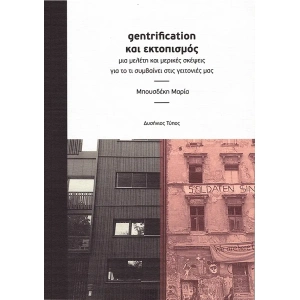Τη δεκαετία του ’60 αποκτά ιστορική διάσταση το νέο κοινωνικό κίνημα, το κίνημα της κοινωνικής εργασίας που αναπτύσσεται σε συνέχεια με το ιστορικά προγενέστερο κίνημα της βιομηχανικής εργασίας και σε σύνδεση με τα παράλληλα αναπτυσσόμενα κινήματα της έμφυλης ισότητας, της φυλετικής-πολιτισμικής ισότητας και της οικολογίας. Η εξέλιξη του νέου κοινωνικού κινήματος στη δεκαετία του ’70 καθορίζεται από τη διπλή αντίθεσή του στο πλαίσιο της “παγκοσμιοποίησης”. Πρώτον, την αντίθεσή του στον “κρατισμό”, ο οποίος όμως ιστορικά συνδέεται με τα καταρρέοντα έθνη-κράτη και τις εθνικές αγορές. Και, σε σύνδεση με τα αναδυόμενα υπερεθνικά κράτη και την παγκόσμια αγορά, την αντίθεσή του στον επερχόμενο νεοφιλελευθερισμό.
Το προϊόν “Θέατρο χωρίς εισιτήριο” έχει προστεθεί στο καλάθι σας. Καλάθι
10.60€ Original price was: 10.60€.7.42€Η τρέχουσα τιμή είναι: 7.42€.
Η Δυναμική του Κοινού, ταξικές αντιθέσεις και ηγεμονία στον κοινωνικό χώρο
Μυθιστόρημα
Γνωρίστε τον/τη Συγγραφέα
Αναρχικοί και εργατικό κίνημα
Πανδαιμόνιο και άλλες ιστορίες από κάτω
Λέξεις που γεννήθηκαν στο δρόµο
Θέατρο χωρίς εισιτήριο
Πλατεία Αξιοπρέπειας. Μια ματιά στη Χιλιανή αντίσταση
Η διαδικασία απελευθέρωσης της μητέρας γης του λαού Νάσα
Gentrification και εκτοπισμός
Οι δρόμοι του παραδείσου
Καπιταλισμός, σοσιαλισμός, οικολογία
Η οικολογική αναδιάρθρωση της κοινωνίας απαιτεί την υποταγή της οικονομικής λογικής σε μια οικο-κοινωνική λογική. Η υποταγή αυτή είναι ασυμβίβαστη με το καπιταλιστικό παράδειγμα της μεγιστοποίησης του κέρδους και της αποδοτικότητας (. . .) Με τη λέξη «σοσιαλισμός» δεν πρέπει να εννοούμε μόνο την υποταγή της οικονομίας στις ανάγκες και τις αξίες της κοινωνίας, αλλά επίσης τη δημιουργία, μέσα από την ελαστικότητα και τις διαρκείς μειώσεις του χρόνου εργασίας, μιας όλο και μεγαλύτερης σφαίρας κοινοτικών μορφών ζωής, εθελοντικής και αυτοοργανωμένης συνεργασίας, αυτόνομα καθοριζόμενων δραστηριοτήτων που να επεκτείνονται διαρκώς. (. . .)




































